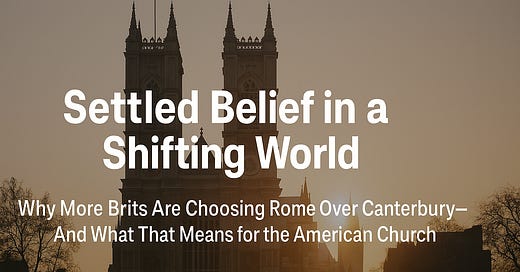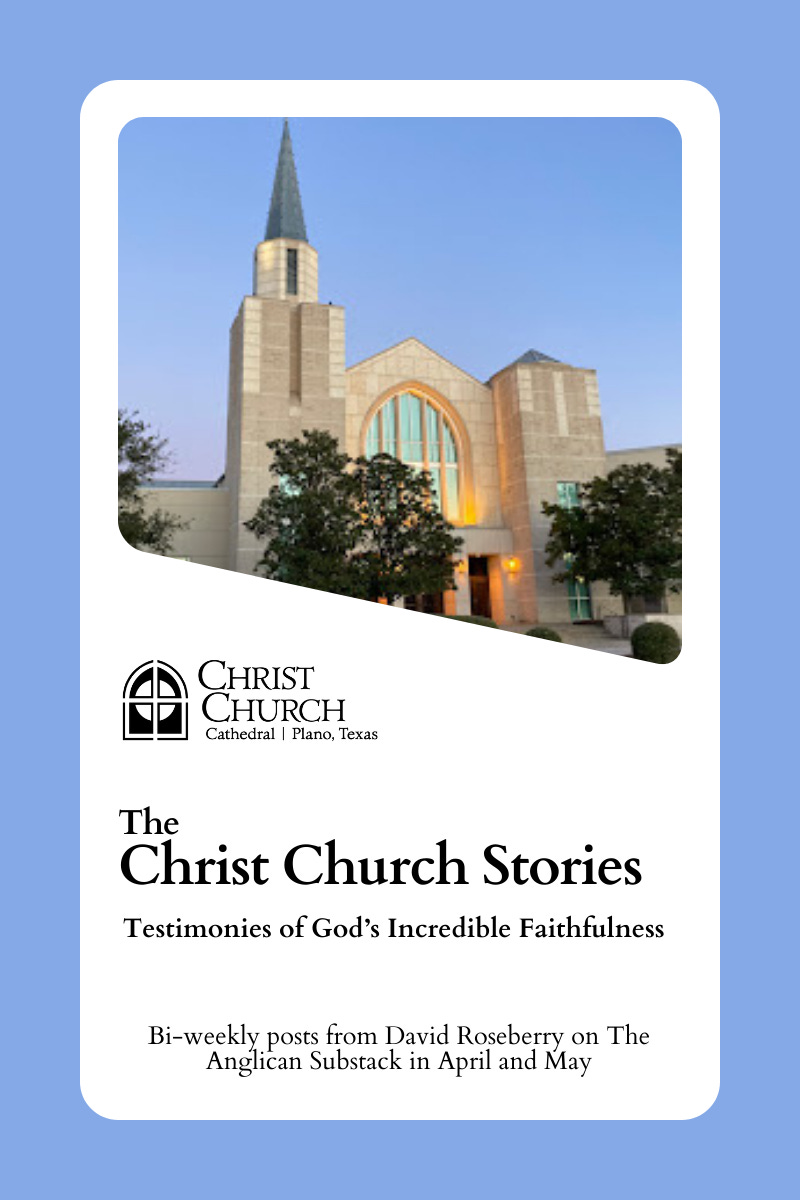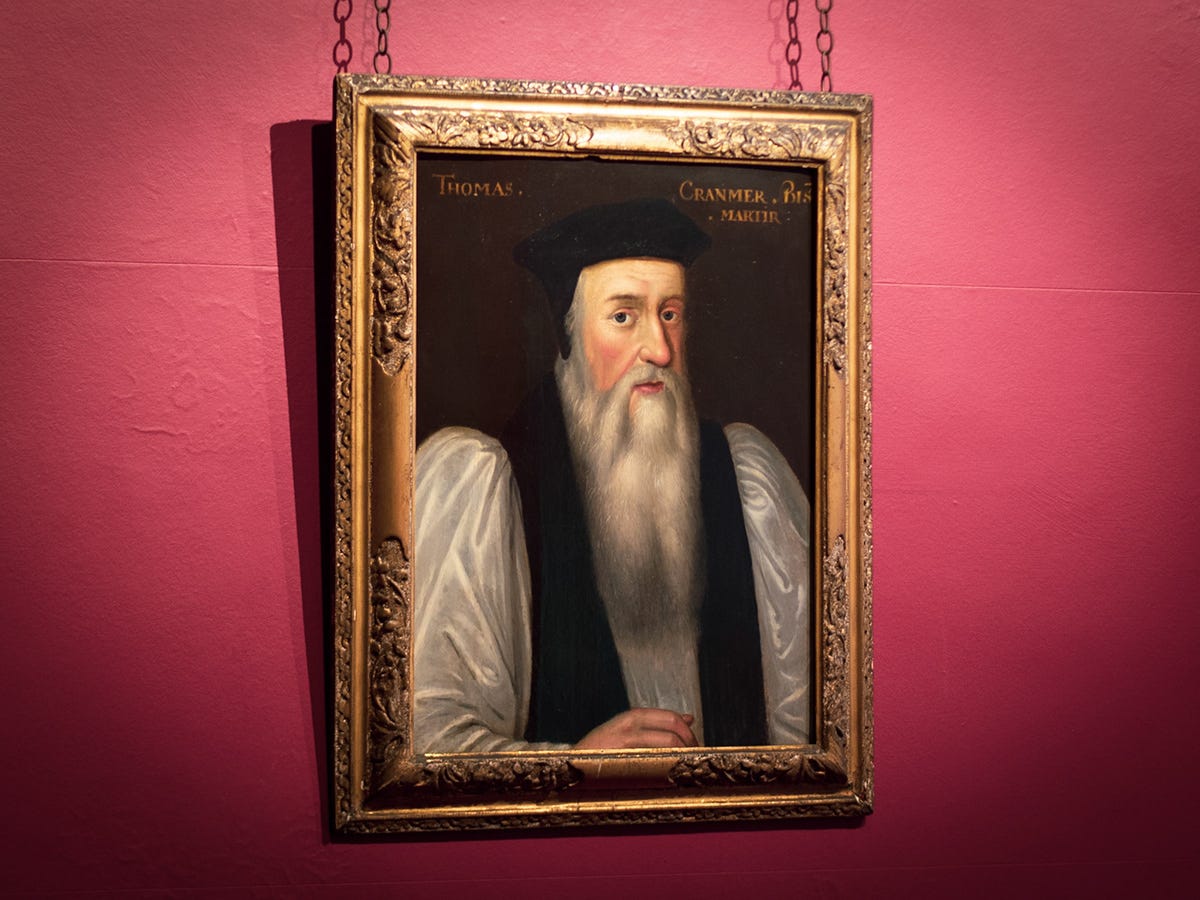Why the Roman Catholic Church Is Rising in England—and What It Reveals About Faith in an Age of Uncertainty
Three Things the Growth of Catholicism Tell Us
Settled Belief in a Shifting World
I remember a story from the time of the American Great Awakening. It may be apocryphal—but like all good stories, it tells the truth.
One farmer said to another, “Hey, let’s go hear George Whitefield preach the Gospel.”
The second farmer scoffed, “Why? You don’t believe the Gospel.”
“You’re right,” the first replied. “But he does.”
That simple exchange reveals something deep about the human spirit:
Conviction is attractive. And strong convictions are strongly attractive.
In an age of moral confusion and cultural uncertainty, people are drawn to those who actually believe what they say—who live as if their core convictions are real and unshakable.
This, more than anything, may explain the quiet shift now unfolding in England. For the first time in centuries, the Roman Catholic Church in England now surpasses the Church of England in active attendance. Among young people, Catholics outnumber Anglicans. In London, the shift is even more pronounced. The tide is turning—and it’s not turning toward trendy liturgies or progressive theology. It’s turning toward clarity, continuity, and conviction.
I am not a sociologist or demographer, but after reading several reports and watching the slow decline of the Anglican Church in England—and its moribund sister, The Episcopal Church in the United States—I am not surprised. Even within the breakaway Anglican Church in North America, of which I am a part, the same questions are surfacing. The Roman Catholic “takeover,” as some headlines put it, is not a fluke. It’s the fruit of something deeper. And I believe there are lessons here for us in the American Church—Catholic and Protestant alike.
There are many reasons why such a shift is taking place, but after reading the reports and summary statements, three fascinate me and hold lessons for Christians in the rest of the world.
1. A Church That Stands or Shifts
There’s a difference between a branch and a leaf.
Roman Catholicism is a branch1 of Christianity—deep-rooted, global, and ancient. Anglicanism, by contrast, is a denomination. It may feel like a branch because of its deep roots in English culture and history, but in truth, it is a denominational leaf—ever adapting, ever reforming.
Every Anglican worldwide, and every Episcopalian in the U.S., knows that even after 500 years, the hierarchy of the church is still thinking through its theology. Its doctrine, famously, is up for a vote. That’s not a small thing.
Roman Catholicism is not democratic. It doesn’t ask the culture to weigh in on what it believes—it declares it. And in an age when society is debating everything—from truth to gender to morality—there is something profoundly reassuring about a church that does not budge.
Women priests? No.
Abortion? Never.
Gender fluidity? Not affirmed.
However, the Anglican Church, even with its closely held principles, because of its penchant for shared governance and democracy and its allergy toward a Roman pope, always seems to be making up its mind.
A Personal Take
During the breakup in the Episcopal Church, I traveled to England more than a few times. Eight years ago, I became friends with the recently resigned Archbishop of Canterbury, Justin Welby. I loved the man. I really did. I was relieved when he took office. He and I had several meetings where I answered his questions about the Anglican Church in North America (ACNA) and he helped me clarify its standing within the broader Anglican Communion. At one point, I even brokered a meeting between Justin and key leaders of the ACNA in both England and the U.S.
I felt like an ambassador, shuttling between continents to help strong leaders connect, gain clarity, and perhaps even forge a pathway for the ACNA to be formally recognized within the. Anglican Communion.
But as I look back, I believe his stewardship over the Church of England was deeply flawed. This realization came as a surprise to me. I had high hopes: here was a solid evangelical convert, impacted by Alpha and the British evangelical movement, a seasoned businessman with global experience and an instinct for leadership.
Yet, over the last decade, I watched him miss opportunity after opportunity. He took strong stands on social justice and built admirable ecumenical relationships. But when it came to standing firm on orthodox beliefs—especially concerning human sexuality—he folded his arms. When he had the chance to clearly distinguish Christianity from Islam, he soft-pedaled.
Even more surprising was how persistently the ACNA called him to repent of his progressive political approach. I found myself thinking, But he’s one of our own. He believes in the atonement. He is born-again. He is, by his own confession, an evangelical Christian.
Of course, I don’t know half the story or half the pressures he faced. But I do know this: when strength and conviction were called for, too often, softness answered. And in the end, an abuse scandal overshadowed his last years in office. He resigned.
To the point of this article, the Church of England, despite its historic status as a national institution, called the Established Church2, and even with an evangelical leader who held biblical principles, continues to shrink.
To put a finer point on it:
To the Church of England, England is a home. To the Roman Catholic Church, England is a Mission.
Pews: Stiff Backs. One Direction.
England is a free country. People can choose the church they want to attend—and increasingly, they are choosing the pews of the Roman Catholic Church over the Anglican ones.
But here’s the irony: in those pews, people think what they want. They can wrestle with the significant issues of our time. They can take their time, ask questions, and even disagree. But what many want—what many need—is the confidence that the church’s leadership believes what it teaches and teaches what it believes.
People want to go where others have settled beliefs. They may not yet share those beliefs, but they are drawn to the clarity. As I used to say to our New Members Class at the church I pastored for 31 years,
“Pews are pews—they have stiff backs, and they face one direction, but you can sit in them however you like.”
Sociologists have long observed that even those with a patchwork of spiritual beliefs are more likely to attend—and remain in—churches where the leaders speak and act with clear, unwavering conviction.3
2. Islam and Incognito Christianity
In our modern Western world, Christianity has long been personalized. It’s about me and Jesus. We say, "Christianity isn’t a religion; it’s a relationship."
But is that really true? Is that all it is? Isn’t there a moral code that comes along with it? Didn’t Jesus teach something?
In any event, the rise of Islam in the UK presents a stark contrast. Islam is clearly a religion—public, practiced, and patterned. You can see it in the dress, the prayer times, the dietary rules, the fasting seasons. And the result? People know who Muslims are and, for the most part, they know what Muslims believe. There’s no ambiguity.
Roman Catholicism reflects a similar structure. It offers a religion, not just a relationship. There are rhythms, rituals, holy days, moral expectations, and communal identity. It’s not something you keep hidden.
Meanwhile, much of Anglicanism—especially true in American Episcopalianism—is what could be called incognito Christianity. It's quiet, sometimes even shy, about its convictions. But in a world filled with loud convictions, that approach can feel uncertain.
People respect the visible. They trust what is practiced. As Muslims show a coherent, embodied faith, some Christians might be waking up to the reality that private belief alone isn't enough. They want a faith that shapes life, not just inner thought.
Some of the most intriguing religious shifts today aren’t happening in suburban parishes or rural chapels—they’re happening among the intellectual elite. Writers, scholars, and public figures like Tom Holland, J. D. Vance, and Paul Kingsnorth (a former radical environmentalist) have either converted to Roman Catholicism or aligned themselves with historic Orthodox Christianity.
Even those who haven’t fully crossed the threshold—like Ayaan Hirsi Ali, a former Muslim and outspoken critic of secular relativism—are turning toward Christianity in search of moral seriousness and coherence. They are not looking for slogans or sentiment.
They are looking for something robust and obvious, rooted and real. And they are finding it not in denominational flexibility but in the ancient, global, and unyielding structure of the Roman Catholic Church.
3. Immigration and the Faith People Carry
There’s a global shift happening. Populations are moving. Cultures are blending. And people don’t leave their faith behind when they migrate—they carry it with them.
That’s especially true with Catholics. When they come to England—from Poland, the Philippines, Brazil—they bring not just their language and food but their faith. And because Roman Catholicism is a branch of Christianity, not a denominational leaf, it thrives wherever it's planted.
We saw this years ago in the United States. Immigrants arriving at Ellis Island founded ethnic Catholic parishes—Irish Catholic, Ukrainian Catholic, and Italian Catholic. They brought their faith with them and built their lives around it—which is what you’d hope faithful people would do.
It’s happening again in England. Catholic churches are being renewed, re-energized, and repopulated by families who know how to live their faith out loud. And that kind of living testimony draws others in.
Behind this immigration story lies another, quieter reality: the fertility gap. The countries sending immigrants to England—places like Nigeria, the Philippines, and Brazil—tend to have higher birth rates and stronger family structures. And Catholic families, in particular, often retain a sense of openness to life, even if not all follow the Church's teaching on contraception to the letter.
By contrast, the Anglican Church, which once led the Christian world in cultural influence, also led the way in softening the moral seriousness of sexual ethics. It’s not widely known, but the Church of England's 1930 Lambeth Conference was the first time any Christian body approved the use of artificial contraception. That decision, once limited in scope, helped pave the way for a broader decoupling of sex from procreation, faith from practice, and belief from visible obedience.
Even more deleterious, the 1948 Lambeth Conference softened its stance on divorce and allowed remarriage in certain circumstances.
Sad but true. Perhaps the chickens are coming home to roost.
The Final Tally
So why is the Roman Catholic Church rising in England while the Anglican Church declines? Because Catholicism offers clarity in a confused age. It offers rootedness in a restless time. It offers a visible, practiced, and morally serious faith in a culture increasingly adrift. And above all, it offers conviction—the kind that draws you in, even if you’re not sure you believe it yourself.
It may have taken five centuries, but the quiet shift is unmistakable.
And for many in England, it’s not just a change in statistics. It’s a return to something sturdy, global, and lasting. A branch—not a leaf. A foundation—not a vote.
Oh, how I wish Anglicans would pay attention to this last point. We need a return to something sturdy, global, and lasting. That used to be called The Anglican Communion. Now it is in tatters.
What This Means for the American Church
The quiet shift in England is a warning and a witness. For the American Church—Catholic and denominational alike—it reminds us that conviction, clarity, and consistency matter. People are drawn to churches that stand firm in their doctrine and live out their faith with visible devotion.
For Catholics, this is a call to steward their clarity with compassion and to welcome those searching for rootedness.
For Protestants, it is a challenge to resist becoming “incognito Christians”—to embrace a practiced, embodied faith that shapes daily life, not just private belief. In a culture swirling with change, the churches that will endure are those who know who they are, what they believe, and why it matters.
—David Roseberry ☩
The Anglican
---
The Anglican is the Substack newsletter for LeaderWorks, where I share insights, encouragement, and practical tools for clergy and lay Christians. I’m also an author of over a dozen books available on Amazon.
If you are a Paid Subscriber, thank you! Thank you for supporting The Anglican and the ministry of LeaderWorks. If you are not a subscriber, please consider becoming one today.
---
Christianity is often described as having three historic branches: Roman Catholicism, Eastern Orthodoxy, and Protestantism. Roman Catholicism and Orthodoxy divided in the Great Schism of 1054, while Protestantism emerged during the Reformation in the 16th century. Anglicanism, though sometimes described as a "middle way," is generally considered a denomination within the Protestant tradition. Thus, while Catholicism is a global branch, Anglicanism remains one of many Protestant expressions.
The Church of England is the established, or state, church in England, meaning it has a formal relationship with the government. The British monarch is the supreme governor of the Church of England, and the Archbishop of Canterbury is the highest-ranking clergyman. This setup means conceptually, there is no formal separation of church and state in the UK.
See Dean M. Kelley, *Why Conservative Churches Are Growing: A Study in Sociology of Religion* (Harper & Row, 1972). Kelley argued that religious groups demanding clear commitment and offering authoritative teaching tend to attract more dedicated adherents than those with fluid or vague beliefs








Another excellent article (are they called articles on Substack? I am quite behind this forum).
As someone who has ministered in Anglican churches in America, Middle East, and now in England (the Church of England) many of the things you mentioned in the article have been my first hand experience here.
I do not want to turn in this into a whole paper itself but I can say that difference between RC and CofE churches and their respective growth figures here have to do with which one of them want to stay true to their identity and resist the world around it re-defining its boundaries and freedoms.
I have worked in all shades of churches in the Church of England and my observation has been that I, as someone who has a vocation to the priesthood, have not progressed in my spirituality in churches that try to reach everyone at the same time. I applaud the motivation and missional sensitivity in this but at the end of the day, these type of churches, in order not to offend particular sensibilities, find themselves offering no more than a therapeutic deism, not catholic and apostolic Christianity as we sing in our Creed. This has to be so because once people open up their New Testament or any document from the early church, they see the stark contrast between this "beige" Christianity that smell and taste so much like the world, and the early church that turned the world upside down by being the most counter-cultural organisation imaginable.
An amazing book I discovered about this topic (why and how the early church grew so much in numbers despite doing everything opposite what we are doing today in the West) is Patient Ferment of the Early Church by Alan Kreider.
As an Anglican, I used to think that it was our strength not to be a confessional church, but I am not sure I agree with that sentiment anymore. Like you said, the world's confusion is pressing around you everyday and one desires a physician after a long day. And when the church, in the name of not looking too arrogant, offers "well it's up to you", then you look for other doctors. Currently, I see a lot of clergy being more interested in being revolutionist in the political sense of the word than being priests, which reminds me of this Chesterton quote:
"The modern revolutionist, being an infinite sceptic, is always engaged in undermining his own mines. In his book on politics he attacks men for trampling on morality; in his book on ethics he attacks morality for trampling on men. Therefore the modern man in revolt has become practically useless for all purposes of revolt. By rebelling against everything he has lost his right to rebel against anything."
That is why Islam is offering a different alternative to people, whether true or not, one with strong convictions. In my own life time, and in different continents and countries, I have never witnessed a church growing in both numbers and discipleship who refused to proclaim with St. Peter that salvation is found in no one else, for there is no other name under heaven given to mankind by which we must be saved.
There are growing and thriving Anglican parishes in England and there are shrinking Roman Catholic parishes, and vice versa. In my own experience, people are drawn to, as you said, churches that do know what they believe without believing that they know everything there is to know.
And I'll jus stop here :)
I think we need to get used to seeing it. Whoever predicted the demise of the RC was thankfully, very wrong.